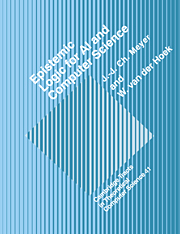4 - DEFAULT REASONING BY EPISTEMIC LOGIC
Published online by Cambridge University Press: 11 November 2009
Summary
In this chapter we shall occupy ourselves with default reasoning, or reasoning by default. In fact we indicate how default logic can be based on epistemic logic, and particularly how we may employ Halpern & Moses' minimal epistemic states for this purpose. In this way we obtain a simple and natural S5-based logic for default reasoning that is well-behaved in a certain way. (We show the logic to be cumulative in the sense of Kraus, Lehmann and Magidor [KLM90].)
Default logic, autoepistemic logic (AEL) and other approaches to non-monotonic reasoning suffer from a technical complexity that is not in line with naive common-sense reasoning. They employ fixed-point constructions or higher-order logic in order to define the belief sets that one would like to associate with some base set of knowledge.
Here we present a modal logic, called EDL, which is an extension of the epistemic logic of Chapter 1. The logic EDL was introduced in [MH91a, MH92], and in [MH93a, 95] we connected it to the theory of Halpern & Moses, as treated in Section 3.1, to obtain a logic for default reasoning. The combined approach is relatively simple compared with AEL, but, more importantly, it is better suited as a default logic than AEL, as we shall show subsequently.
Our approach — unlike AEL — does not involve any fixed points or higher-order formulas. The basis for this logic is the simple S5-modal logic of Chapter 1. EDL contains a knowledge (certainty) operator and (dual) possibility operator.
- Type
- Chapter
- Information
- Epistemic Logic for AI and Computer Science , pp. 159 - 210Publisher: Cambridge University PressPrint publication year: 1995
- 1
- Cited by



